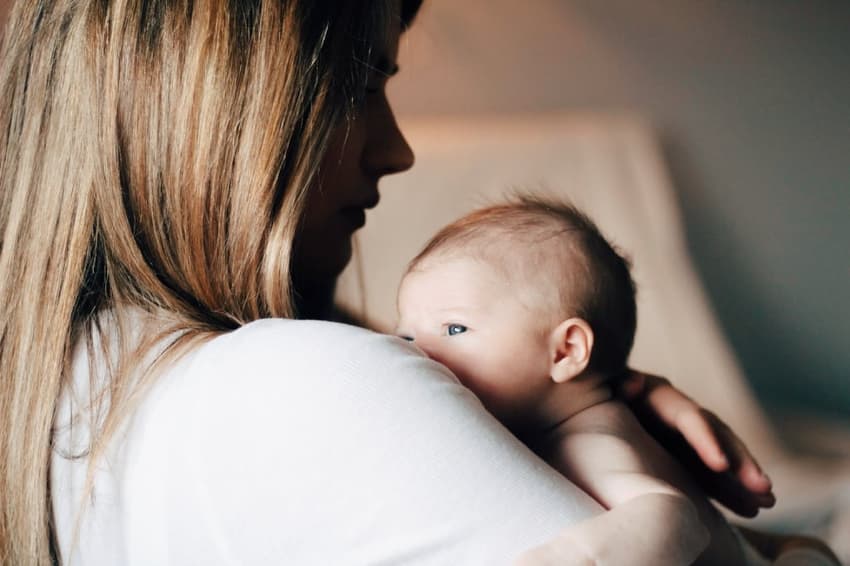More than two-thirds of mothers 'currently employed' in Germany

The proportion of employed mothers with young children on the rise in Germany - but the latest statistics also reveal persistent gender inequalities.
Since 2005, the percentage of mums who were working alongside childcare duties has gone up by nine percent to 69 percent, according to micro-census data published by the Federal Office of Statistics (Destatis).
Over the same period, the percent of working fathers also slid up slightly from 88 percent to 92 percent.
But while the majority of fathers were in full-time employment, most mothers were still in part-time work. According to Destatis, this dynamic applied to 65 percent of the couples surveyed.
The biggest gender differences applied to families with newborn babies.
READ ALSO: Parents in Germany 'facing burnout' due to limited childcare options
In households with a child less than one-year old, one in eight mothers (13 percent) were employed in 2022, compared to 87 percent of fathers. It's common for mothers in Germany, however, to take upwards of a year of parental leave, paid at 65 percent of their salary.
READ ALSO: Everything you need to know about parental leave in Germany
For children aged two to under three, 64 percent of mothers and 92 percent of fathers were employed.
There was also a much bigger jump in the number of mothers in employment as the age of the child increased. Among fathers, the difference was much less dramatic.
The dramatic increase in the number of mothers in employment can be partly put down to the expansion of childcare services during this time, Destatis explained.
However, legislation designed to encourage fathers to contribute more to childcare - such as the 2007 parental allowance (Elternzeit) scheme - seems not have had a limited effect, as the number of fathers in work also increased over this period.
The statistics point to a very unequal distribution of paid work between mothers and fathers as well as a very unequal distribution of unpaid care work, said Bettina Kohlrausch, scientific director of the Hans Böckler Foundation's Economic and Social Science Institute.
The figures also demonstrate that "caring for children is difficult to reconcile with full-time employment for both parents", Kohlrasch added. It then usually falls on mothers to make compromises in their working life.
In another sign of enduring gender inequalities, women in working couple relationships also continue to spend more time on household chores and care work than men.
READ ALSO: Who is affected by Germany's proposal to reduce 'Elterngeld' eligibility?
According to another study by the Hans Böckler Foundation, around 62 percent of women feel responsible for completing household chores and keeping appointments, compared to just 20 percent of men.
When children live in the household alongside a working couple, the discrepancies are even greater, the study revealed.
Comments
See Also
Since 2005, the percentage of mums who were working alongside childcare duties has gone up by nine percent to 69 percent, according to micro-census data published by the Federal Office of Statistics (Destatis).
Over the same period, the percent of working fathers also slid up slightly from 88 percent to 92 percent.
But while the majority of fathers were in full-time employment, most mothers were still in part-time work. According to Destatis, this dynamic applied to 65 percent of the couples surveyed.
The biggest gender differences applied to families with newborn babies.
READ ALSO: Parents in Germany 'facing burnout' due to limited childcare options
In households with a child less than one-year old, one in eight mothers (13 percent) were employed in 2022, compared to 87 percent of fathers. It's common for mothers in Germany, however, to take upwards of a year of parental leave, paid at 65 percent of their salary.
READ ALSO: Everything you need to know about parental leave in Germany
For children aged two to under three, 64 percent of mothers and 92 percent of fathers were employed.
There was also a much bigger jump in the number of mothers in employment as the age of the child increased. Among fathers, the difference was much less dramatic.
The dramatic increase in the number of mothers in employment can be partly put down to the expansion of childcare services during this time, Destatis explained.
However, legislation designed to encourage fathers to contribute more to childcare - such as the 2007 parental allowance (Elternzeit) scheme - seems not have had a limited effect, as the number of fathers in work also increased over this period.
The statistics point to a very unequal distribution of paid work between mothers and fathers as well as a very unequal distribution of unpaid care work, said Bettina Kohlrausch, scientific director of the Hans Böckler Foundation's Economic and Social Science Institute.
The figures also demonstrate that "caring for children is difficult to reconcile with full-time employment for both parents", Kohlrasch added. It then usually falls on mothers to make compromises in their working life.
In another sign of enduring gender inequalities, women in working couple relationships also continue to spend more time on household chores and care work than men.
READ ALSO: Who is affected by Germany's proposal to reduce 'Elterngeld' eligibility?
According to another study by the Hans Böckler Foundation, around 62 percent of women feel responsible for completing household chores and keeping appointments, compared to just 20 percent of men.
When children live in the household alongside a working couple, the discrepancies are even greater, the study revealed.
Join the conversation in our comments section below. Share your own views and experience and if you have a question or suggestion for our journalists then email us at [email protected].
Please keep comments civil, constructive and on topic – and make sure to read our terms of use before getting involved.
Please log in here to leave a comment.